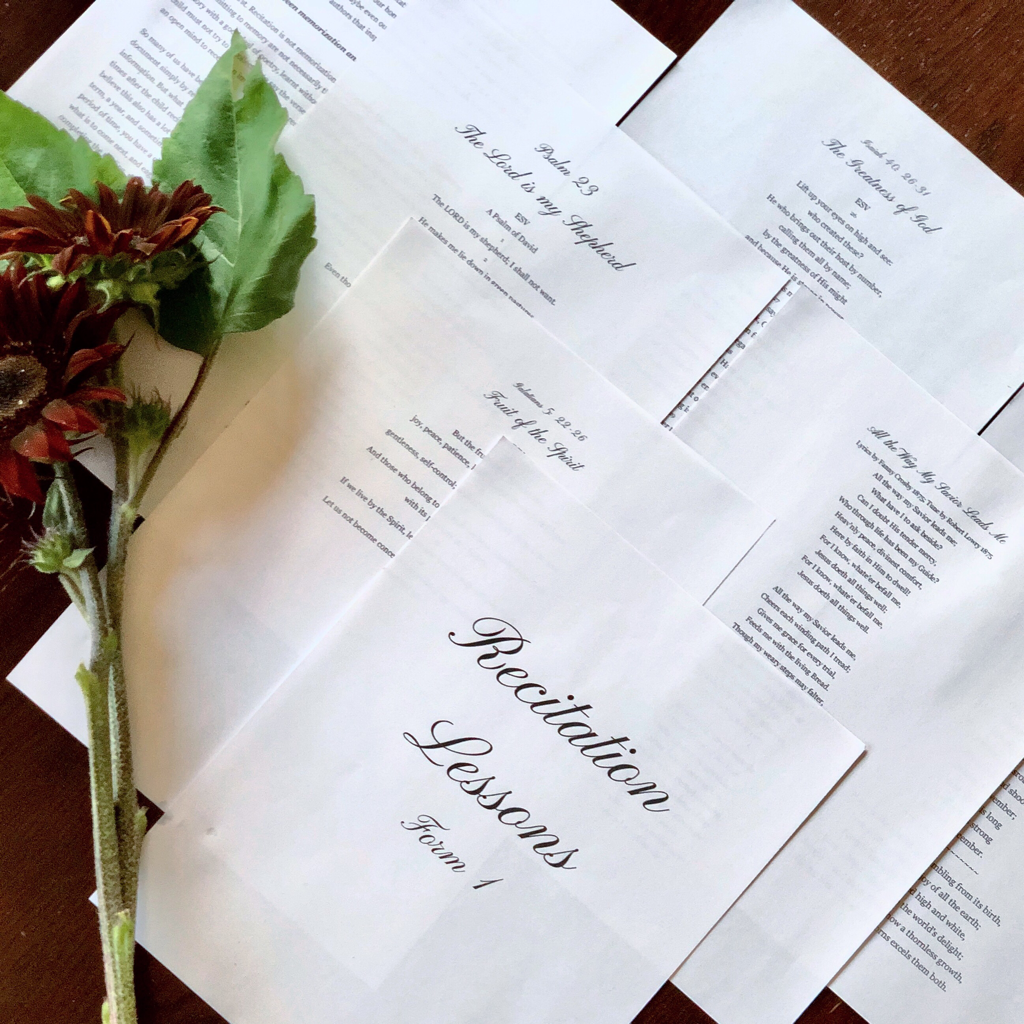The difference between memorization and recitation First things first. Recitation is not memorization. As Charlotte Mason reminds us, “Recitation and committing to memory are not necessarily the same thing and it is well to store a child’s memory with a good deal of poetry, learnt without labor.” p.224 of Home Education. And, “The child must not try to recollect or to say the verse over to himself, but, as far as may be, present an open mind to receive an impression of interest.” p. 224 of Home Education. So many of us have been accustomed to memorizing scripture, poetry, or maybe a historic document simply by repeating, line by line, over and over, until we can effortlessly speak the information. But what I’ve noticed, not only in my children but other children as well, that many times after the child recites the memorized words, passages, or poems, it is quickly forgotten. I believe this also has a lot to do with Charlotte Mason’s beliefs of stretching literature over a term, a year, and sometimes even three years. When you read a living book for an extended period of time, you have a chance to think about what you read throughout the week, ponder on what is to come next, and eagerly return to where you left off the following week. After completing the reading, many times you will feel as if you’ve parted with a long-time friend whom you've come to love and adore, and usually the literature leaves behind a lasting memory of that friendship, whom you might come to revisit in the years to come. On the contrast, when you engulf a book in a weekend, sure you might feel a thrill, an excitement knowing how the story ends so quickly, but usually that satisfaction fades away, you quickly forget the story, and unfortunately miss many details that you didn't stop to savor over. I believe this is similar to memorization vs recitation. To memorize quickly, with an end goal of simply feeling accomplished or to check the box, I believe there is little value. But to recite beautiful words, over the course of 12 weeks, ponder, make connections, is far more rewarding. Of course, most of the time you will naturally commit these recitations to memory, which is the beautiful part of recitation, but even if you don’t, you will make connections with the words, thoughts, and ideas that will stay with you for a lifetime. And who knows when those words will come to mind when you are in a certain situation. Specifically about Bible Verses, Mason says, “It is a delightful thing to have the memory stored with beautiful, comforting, and inspiring passages, and we cannot tell when and how this manner of seed may spring up, grow, and bear fruit;” p.253 of Home Education. Choosing passages and literature selections Charlotte Mason suggests that each term children should recite a Psalm, an Old Testament passage, a New Testament passage, a Hymn, and a poem and/or lines from a Shakespeare play. It will be of great benefit if the chosen selections are what the child is currently studying that term. As your child advances through the forms, the passages should become longer. It is suggested for Form 1 to start with a Psalm, 6 verses of Old and New Testament passages, a poem of a child’s choice, and a hymn. For Form 2, you continue with a Psalm, 12 verses of Old and New Testament passages, 30-50 lines of a child’s choice of poetry and/or lines from a Shakespeare play that you are currently studying, and a hymn or two. You continue as well in Form 3 and 4 by increasing the number of verses and lines reciting. How to conduct recitation lessons Having selected a Psalm, an Old Testament passage, a New Testament passage, Hymn, and/or poem/Shakespeare lines, you can put all of the selections in a binder and dedicate 10 minutes each day to have your student read out loud one passage. You can create a schedule where on Mondays you recite a Psalm, on Tuesdays an Old Testament passage, on Wednesdays a New Testament passage, and so on. Begin by reading the passage to your child, pointing out the noticeable parts, and taking note not to impose your own emotion that you feel through the passage. Allow the child to bring out their own feelings and emotions through the passage. The child should stand while reading, with a good posture, and being very careful about pronunciations. Encourage them to speak slowly and eloquently. Charlotte Mason writes, “The child should speak beautiful thoughts so beautifully, with such delicate rendering of each nuance of meaning, that he becomes to the listener the interpreter of the author’s thought.” p.223 of Home Education. Arthur Burrell writes in his article how to teach the children to recite beautifully and what you should encourage or discourage in the art of recitation. If you ever have the chance to read it, it will greatly enhance recitation lessons in your home. But start here, start now. Recitation should not be difficult to implement. And as you grow in your knowledge of the art, add more here and there, but never so much that it overwhelms your homeschool. “For good authors cannot die; the human voice is forever conferring immortality upon them.” -Arthur Burrell HERE is a link to Charlotte Mason Says podcast to hear me speak on Recitation. HERE is a link to Arthur Burrell's The Parents' Review article: Recitation: The Children's Art. HERE is a link to read Arthur Burrell's book, Clear Speaking and Good Reading.
4 Comments
Hi Ella-
Reply
Ella
8/10/2020 11:13:44 pm
Thank you for reaching out Shay. Email sent!
Reply
10/30/2023 06:17:25 am
An amazing and helpful source of information. I'm grateful that you've shared this useful information with us.
Reply
Leave a Reply. |
